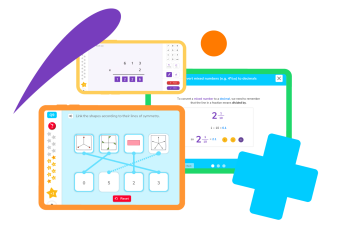Home → Maths → Year Groups → KS1
You made it through the first year and now it’s time for Key Stage 1! Maths anxiety can increase as children get older but it doesn’t have to. As parents, we can help our child succeed in KS1 maths by learning what to expect. Explore KS1 maths topics below, including tips for KS1 maths SATs, and have a go at some practice questions!

Explore the maths topics covered in KS1 maths and have a go at some fun, interactive practice questions!
Explore strategies for mental and written problem solving
Discover key multiplication and division facts & strategies

Explore strategies for mental and written problem solving

Discover key multiplication and division facts
In Key Stage 1 maths curriculum, kids explore a wide breath of content to help develop their knowledge of core concepts and gain an understanding of how maths is used in everyday life. From fractions to shapes, they learn lots of key skills that’ll place them in great stead for KS2! The main topics they learn about are…
1. Number and place value: In the KS1 maths curriculum, children learn to count, read, write and represent numbers up to 100. They also learn how to compare numbers and use the place value system.
2. Addition and subtraction: Children learn various strategies for mental and written addition and subtraction. They also explore number bonds, counting techniques and inverse operations.
3. Multiplication and division: Kids develop their understanding of multiplication and division and learn how to solve problems using multiplication and division facts, arrays and pictorial representations.
4. Fractions: Learners discover how to recognise, name, find and write fractions in relation to length, shapes and quantity.
5. Measurement: In KS1 maths, children learn how to use appropriate units, estimate measurements and read scales, including length, capacity and time.
6. Properties of shapes: Learners explore the fundamentals of shapes, including how to recognise and name different types of 2D and 3D shapes.
7. Position and direction: Children learn how to describe position, direction and movement, as well as how to organise objects into patterns and sequences.
8. Statistics: In the KS1 curriculum, kids explore how to collect and organise data. They also learn how to create graphs and interpret data using a variety of graphs.
In Year 2, children complete maths and English SATs papers. Explore what’s covered in the exams and how you can help your child or pupils prepare for them!
See what’s covered in KS1 SATs and how you can help your child prepare for them
Our apps cover the whole KS1 curriculum, making them perfect study buddies
KS1 maths SATs may seem worrying, but these tips will help you feel prepared!
See what’s covered in KS1 SATs and how you can help your child prepare for them
Our apps cover the whole KS1 curriculum, making them the ultimate study buddies
KS1 maths SATs may seem worrying, but these tips will help you feel prepared!
DoodleMaths is an award-winning app that's filled with fantastic maths games for KS1!
From working in a messy bakery to helping a monkey collect coconuts, all of its games are specifically designed to develop instant recall and mental maths skills, transforming learning into a fun adventure.
Best of all, all of its questions feel like a game, with every exercise using interactive activities and explanations to help bring the subject to life!
Create an account today to enjoy a free 7-day trial.
There are lots of ways that you can help your child or pupils to learn KS1 maths:
You
An array is an arrangement of items (such as pictures or numbers) in columns or rows.
They let children visualise what happens when they multiply or divide numbers together, helping them master times tables and division!
Reasoning is basically detective work: it's when learners use what they already know to work out the answer to a question.
For example, if a child knows what 12 - 5 is, they can use this knowledge to work out what 12 - 6 is.
"I know that 12 - 5 is 7. As 6 is 1 higher than 5, the answer must be 1 higher than 7."

Parents, sign up for a DoodleMaths subscription and see your child become a maths wizard!

Book a chat with our team
If you’d like to use Doodle’s browser version, please visit this page on a desktop.
To log in to Doodle on this device, you can do so through our apps. You can find out how to download them here: